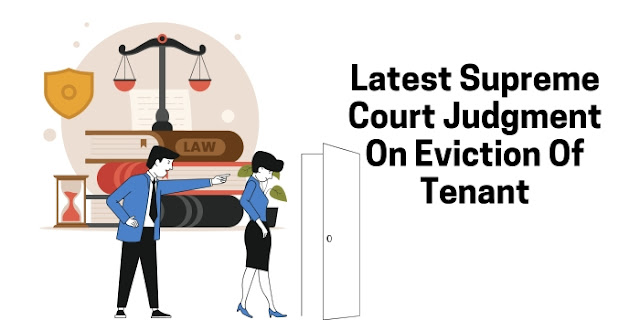Latest Supreme Court Judgment On Eviction Of Tenant

The Supreme Court's recent judgment on tenant eviction has stirred discussions and debates across the legal landscape. This landmark ruling has far-reaching implications for both landlords and tenants. In this blog, we delve into the details of the judgment, its significance, and what it means for parties involved in rental agreements.
The Background:
Before diving into the specifics of the judgment, let's set the stage by understanding the context in which it was delivered. Tenant-landlord disputes have been a recurring issue, often entangled in legal complexities and varying interpretations of rental laws. Over the years, the judiciary has grappled with balancing the rights and responsibilities of both parties, aiming to ensure fairness and justice.
Key Highlights of the Judgment:
Clarification on Grounds for Eviction: One of the crucial aspects of the recent judgment is the clarification of grounds on which a landlord can seek eviction of a tenant. The Supreme Court has provided clear guidelines, narrowing down the circumstances under which eviction is permissible. This clarity brings much-needed consistency and reduces ambiguity in legal proceedings.
Protection of Tenant Rights: While recognizing the rights of landlords, the judgment also emphasizes the importance of safeguarding the interests of tenants. It reinforces the principle that eviction should not be arbitrary or unjust, highlighting the need for due process and adherence to legal requirements.
Role of Rent Control Laws: The judgment sheds light on the role of rent control Act in regulating tenant-landlord relationships. It underscores the significance of these laws in balancing the interests of both parties and ensuring affordable housing for tenants, especially in urban areas where rental markets can be highly competitive.
Implications for Landlords:
For landlords, the Supreme Court's ruling brings clarity and predictability to the eviction process. It underscores the importance of following legal procedures diligently and respecting tenant rights. Landlords must ensure that they have valid grounds for eviction as prescribed by law and adhere to the due process outlined in the judgment.
Implications for Tenants:
Tenants stand to benefit from the judgment as it reinforces their rights and provides protection against arbitrary eviction. It empowers tenants to challenge unjust eviction attempts and ensures that they are not unfairly displaced from their homes. However, tenants must also fulfill their obligations under the rental agreement to avoid legal disputes.
Legal Precedent and Future Cases:
The recent Supreme Court judgment on tenant-landlord is expected to serve as a legal precedent in future disputes. It provides a framework for interpreting rental laws and resolving conflicts in a fair and equitable manner. Legal practitioners and courts are likely to refer to this judgment in similar cases, ensuring consistency and coherence in judicial decisions.
Conclusion:
The Supreme Court's latest judgment on tenant eviction marks a significant milestone in rental law jurisprudence. By clarifying the grounds for eviction and emphasizing the rights of both landlords and tenants, the judgment promotes fairness and justice in rental relationships. It is a reminder of the importance of upholding the rule of law and respecting the rights of all parties involved. Moving forward, stakeholders in the rental market must adhere to the principles laid down in this judgment to ensure a harmonious and equitable environment for all.

%20(38).jpg)
